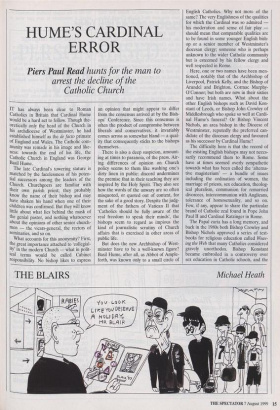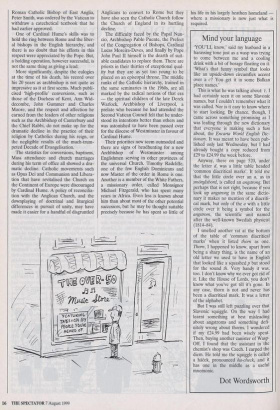HUME'S CARDINAL ERROR
Piers Paul Read hunts for the man to
arrest the decline of the Catholic Church
IT has always been clear to Roman Catholics in Britain that Cardinal Hume would be a hard act to follow. Though the- oretically only the head of the Church in his archdiocese of Westminster, he had established himself as the de facto primate of England and Wales. The Catholic com- munity was remade in his image and like- ness: towards the end of his life, the Catholic Church in England was George Basil Hume.
The late Cardinal's towering stature is matched by the facelessness of his poten- tial successors among the leaders of the Church. Churchgoers are familiar with their own parish priest; they probably know the name of their bishop and may have shaken his hand when one of their Children was confirmed. But they will know little about what lies behind the mask of the genial pastor, and nothing whatsoever about the opinions of other senior church- men — the vicars-general„ the rectors of seminaries, and so on.
What accounts for this anonymity? First, the great importance attached to 'collegial- ity' in the modern Church — what in polit- ical terms would be called Cabinet responsibility. No bishop likes to express an opinion that might appear to differ from the consensus arrived at by the Bish- ops' Conference. Since this consensus is often the product of compromise between liberals and conservatives, it invariably comes across as somewhat bland — a qual- ity that consequently sticks to the bishops themselves.
There is also a deep suspicion, amount- ing at times to paranoia, of the press. Air- ing differences of opinion on Church policy seems to them like washing one's dirty linen in public: discord undermines the premise that in their teaching they are inspired by the Holy Spirit. They also see how the words of the unwary are so often misquoted, or quoted out of context, for the sake of a good story. Despite the judg- ment of the fathers of Vatican II that 'Catholics should be fully aware of the real freedom to speak their minds', the bishops seem to regard as impious the kind of journalistic scrutiny of Church affairs that is exercised in other areas of public life.
But does the new Archbishop of West- minster have to be a well-known figure? Basil Hume, after all, as Abbot of Ample- forth, was known only to a small circle of English Catholics. Why not more of the same? The very Englishness of the qualities for which the Cardinal was so admired — his moderation and sense of fair play — should mean that comparable qualities are to be found in some younger English bish- op or a senior member of Westminster's diocesan clergy; someone who is perhaps unknown to the wider Catholic community but is esteemed by his fellow clergy and well respected in Rome.
Here, one or two names have been men- tioned, notably that of the Archbishop of Liverpool, Patrick Kelly, and the Bishop of Arundel and Brighton, Cormac Murphy- O'Connor; but both are now in their sixties and have Irish names. What about the other English bishops such as David Kon- stant of Leeds, or Bishop John Crowley of Middlesbrough who spoke so well at Cardi- nal Hume's funeral? Or Bishop Vincent Nichols, an area bishop in the Diocese of Westminster, reputedly the preferred can- didate of the diocesan clergy and favoured as his successor by Cardinal Hume?
The difficulty here is that the record of the existing English bishops may not neces- sarily recommend them to Rome. Some have at times seemed overly sympathetic towards what has been called the 'alterna- tive magisterium' — a bundle of issues including the ordination of women, the marriage of priests, sex education, theolog- ical pluralism, communion for remarried divorcees, intercommunion with Anglicans, tolerance of homosexuality, and so on. Few, if any, appear to share the particular brand of Catholic zeal found in Pope John Paul II and Cardinal Ratzinger in Rome.
The Papal curia has a long memory, and back in the 1980s both Bishop Crowley and Bishop Nichols approved a series of text- books for religious education called Weav- ing the Web that many Catholics considered gravely unorthodox. Bishop Konstant became embroiled in a controversy over sex education in Catholic schools, and the Roman Catholic Bishop of East Anglia, Peter Smith, was ordered by the Vatican to withdraw a catechetical textbook that he had earlier approved.
One of Cardinal Hume's skills was to hold the ring between Rome and the liber- al bishops in the English hierarchy, and there is no doubt that his efforts in this respect were appreciated by the Pope. But, a holding operation, however successful, is not the same thing as giving a lead.
More significantly, despite the eulogies at the time of his death, his record over his 20 years as archbishop is not quite as impressive as it at first seems. Much publi- cised 'high-profile' conversions, such as those of the Duchess of Kent, Ann Wid- decombe, John Gummer and Charles Moore, and the respect and affection he earned from the leaders of other religions such as the Archbishop of Canterbury and the Chief Rabbi, do not make up for the dramatic decline in the practice of their religion by Catholics during his reign, or the negligible results of the much-trum- peted Decade of Evangelisation.
The statistics for conversions, baptisms, Mass attendance and church marriages during his term of office all showed a dra- matic decline. Catholic movements such as Opus Dei and Communion and Libera- tion that have revitalised the Church on the Continent of Europe were discouraged by Cardinal Hume. A policy of reconcilia- tion with the Anglican Church, and the downplaying of doctrinal and liturgical differences in pursuit of unity, may have made it easier for a handful of disgruntled Anglicans to convert to Rome but they have also seen the Catholic Church follow the Church of England in its hurtling decline.
The difficulty faced by the Papal Nun- cio, Archbishop Pablo Puente, the Prefect of the Congregation of Bishops, Cardinal Lucas Moreira-Deves, and finally by Pope John Paul II himself is the dearth of suit- able candidates to replace them. There are priests in their thirties of exceptional qual- ity but they are as yet too young to be placed on an episcopal throne. The middle ranks of the Catholic hierarchy, trained in the same seminaries in the 1960s, are all marked by the radical notions of that era — the spiritual children of the late Derek Warlock, Archbishop of Liverpool, a prelate who because he had attended the Second Vatican Council felt that he under- stood its intentions better than others and was astonished to have been passed over for the diocese of Westminster in favour of Cardinal Hume.
Their priorities now seem outmoded and there are signs of headhunting for a new Archbishop of Westminster among Englishmen serving in other provinces of the universal Church. Timothy Radcliffe, one of the few English Dominicans and now Master of the order in Rome is one. Another is a member of the White Fathers, a missionary order, called Monsignor Michael Fitzgerald, who has spent many years in Africa. Even less is known about him than about most of the other potential successors, but he may be thought suitable precisely because he has spent so little of his life in his largely heathen homeland — where a missionary is now just what is required.



























































 Previous page
Previous page